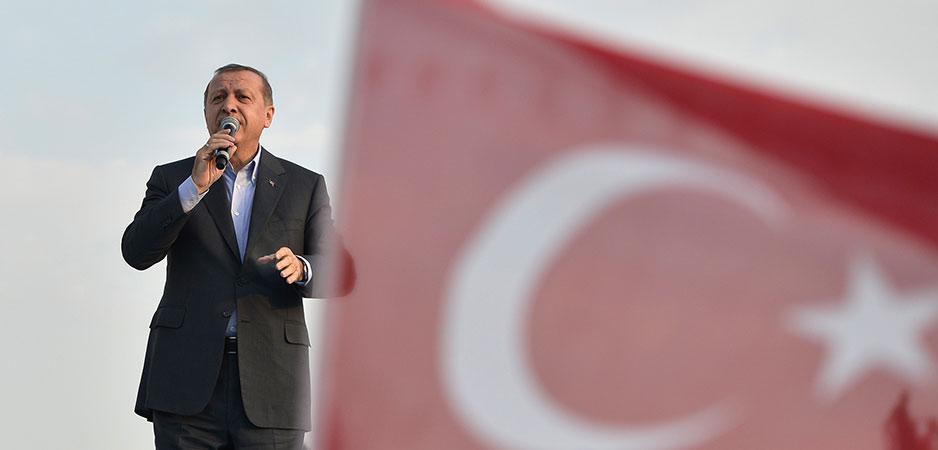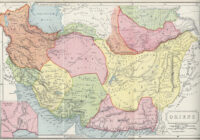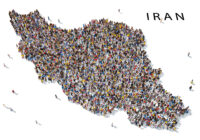We are told we live in an era of strongmen. The narrative also runs that these strongmen stick together. From the cozy relationship between China and Russia at the UN Security Council — led by Presidents Xi Jinping and Vladimir Putin — to the mutual support of the likes of Saudi Crown Prince Mohammed bin Salman and Egypt’s Abdul Fattah al-Sisi. Even US President Donald Trump — though no strongman in the autocratic sense — has voiced his approval of such leaders.
A regular on this list of autocratic strongmen riding a wave of neo-nationalist illiberalism is Turkish President Recep Tayyip Erdogan. On the face of things, it’s easy to lump him in with the others — and most media portrayals do — but much like the country he leads, he is, on closer inspection, something of an oddity in international politics.
Turkish Exceptionalism
Perhaps that shouldn’t be surprising. After all, Turkey is one of those nation-states linked to an imperial past that encourages a good dose of exceptionalism. In its region, perhaps only Iran holds a resemblance. Turkey is not of the Arab world, nor is it truly European. Neither is it in the Russian orbit. It is a place apart, much like Iran.
And when we turn to its foreign policy under the Justice and Development Party (AKP), which equates to its policy under the guidance of President Erdogan, we find a contrary type of strongman politics. Erdogan is far from a regular member of the dictators’ club. In fact, he shuns strongmen, from Egypt’s al-Sisi and Saudi Arabia’s bin Salman to Syrian President Bashar al-Assad and would-be Libyan strongman, General Khalifa Haftar.
Perhaps President Erdogan’s most comfortable – if still uneasy – strongman relationship is with the Russian president, Vladimir Putin. Yet in foreign policy, Turkey does not emulate Russia. The overt Russian nationalism that has allowed President Putin to project power beyond Russia’s borders under the guise of protecting ethnic Russians abroad is not the central feature of Turkish policy.
Clearly, Turkey expresses an interest in the affairs of Turkish minorities in countries such as Bulgaria, but as a wider policy, ethnic nationalism is not a feature of the Turkish administrations of the 21st century. From Xinjiang to Myanmar, Somalia to Libya, if there is a constant, it is a pan-Islamic fraternity that is emphasized.
During the formative era of republican Turkey, under Mustafa Kemal Ataturk, a strand of Eurasianism was highly influential in Turkey that saw the wider Turkic world as a natural focus for foreign policy. Turkish political thinkers were keen to engage Turkic kin in an expressly ethnic nationalist discourse. In contrast, recent Turkish governments have focused on a cultural and religious fraternity over a purely racial one.
Who Directs Turkey?
Given that President Erdogan is often regarded as a populist, nationalist figure, how is this lack of ethnic nationalist focus explained in Turkish foreign policy? It could be argued that President Erdogan is not the sole source of Turkish policy. Other forces can influence the direction of Turkish external relations.
Yet, if Turkish foreign policy is based in a sense of pan-Islamic unity, is that not closer to the thinking of those leading the Islamic Republic of Iran? Again, many divides exist. Most obviously, the two regimes are on opposite sides of Islam’s schism between the Sunni and the Shia. Also, President Erdogan may be a devout man, but he is no theologian.
Indeed, Turkey and Iran are on opposite sides in the most acute conflict facing Turkey right now, that of the Syrian Civil War. So then, who is on Turkey’s side? Well, Sheikh Tamim bin Hamid al-Thani, the Emir of Qatar, with whom Turkey is also aligned in Libya’s Civil War. This relationship points to the wider Turkish support for political Islam in the form of the Muslim Brotherhood, but does that make Qatar and Turkey true bedfellows? President Erdogan may not be a mullah, but he is also not a hereditary monarch.
Perhaps what Turkey opposes and supports externally is best understood by looking inside Turkey? Until you appreciate the inner workings of the Turkish state, its external positions can appear opaque.
Over the past decade, the Turkish AKP governments have been seen to restrict the civic space inside the country, suppressing opposition, particularly from parties with a Kurdish political platform. In the wake of the failed coup of 2016, there has been a systematic attempt to suppress and exclude supporters of the Gulenist movement of exiled cleric Fethullah Gulen.
Revolutionary Break
Yet despite these illiberal moves, Turkey is at loggerheads with illiberal leaders across its region. It must be remembered that President Erdogan is not an autocrat in the way others are. He is a populist, certainly, but he is a popularly elected president. The extent to which opposition to tyranny — whether in Egypt, Syria, Libya or elsewhere — is tied up with the popular legitimacy of the ruling AKP in Turkey should not be underestimated.
Turkey has a long history of illiberalism. To many, that makes the era of President Erdogan one of continuity rather than change. Yet that history of illiberalism has been one of secular-military, not Islamic, oppression. Turkey’s history is that of forcible Kemalist Westernization and military coups to prop up secular elites.
In that context, Erdogan and his party still represent a radical, almost revolutionary break in the history of their neighborhood. They aren’t an Islamic theocracy, nor are they a secular autocracy. Instead, they are a popularly elected Islamic movement that thrives on being seen to be in tune with the ordinary people on the street — something in stark contrast to many regimes in Turkey’s immediate neighborhood.
All this makes Turkey hard to call. Many have speculated that the current pandemic is a boon to autocracies keen to control their populations and restrict their movements. It is assumed by many that Turkey and its president fall nicely under that umbrella. Yet Turkey is still a democracy, and the drivers of Turkish foreign policy are complex, and Turkey’s position and history unique.
What will work for other strongmen might well not work for Turkey’s president. It’s easy to try dividing the world into liberal and illiberal camps, but ultimately, each political entity is at the mercy of its own forces, both internal and external. In the case of Turkey, those forces are particularly unusual, and its position particularly acute. The next few years will be a testing time for this extraordinary nation.
The views expressed in this article are the author’s own and do not necessarily reflect Fair Observer’s editorial policy.
Support Fair Observer
We rely on your support for our independence, diversity and quality.
For more than 10 years, Fair Observer has been free, fair and independent. No billionaire owns us, no advertisers control us. We are a reader-supported nonprofit. Unlike many other publications, we keep our content free for readers regardless of where they live or whether they can afford to pay. We have no paywalls and no ads.
In the post-truth era of fake news, echo chambers and filter bubbles, we publish a plurality of perspectives from around the world. Anyone can publish with us, but everyone goes through a rigorous editorial process. So, you get fact-checked, well-reasoned content instead of noise.
We publish 2,500+ voices from 90+ countries. We also conduct education and training programs
on subjects ranging from digital media and journalism to writing and critical thinking. This
doesn’t come cheap. Servers, editors, trainers and web developers cost
money.
Please consider supporting us on a regular basis as a recurring donor or a
sustaining member.
Will you support FO’s journalism?
We rely on your support for our independence, diversity and quality.






